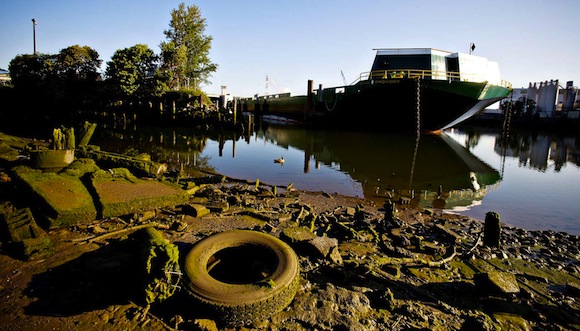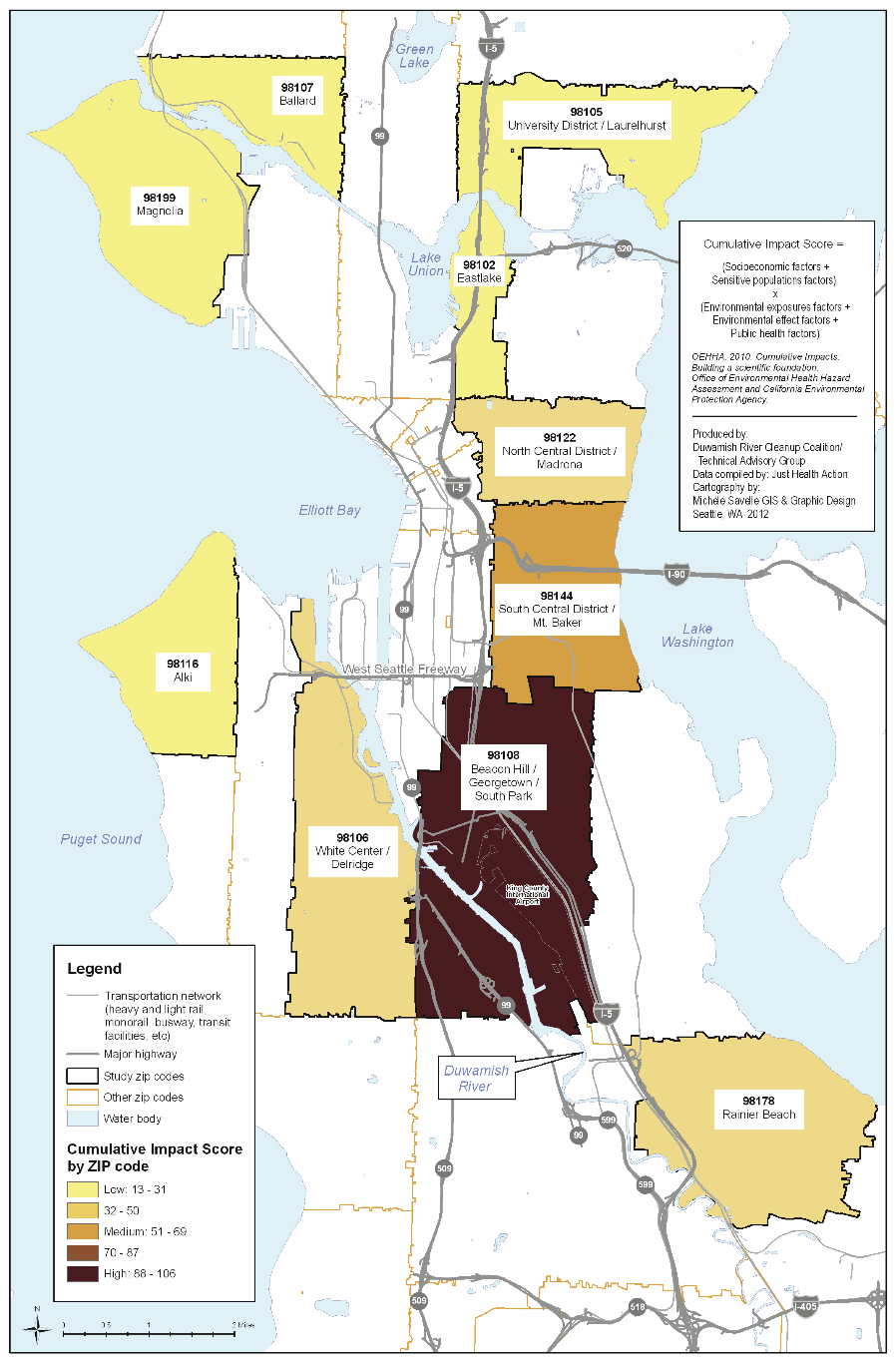
Tidal flats littered with debris along the Lower Duwamish River. Photo credit: Paul Joseph Brown/ecosystemphoto.com
The residents of south Seattle’s 98108 ZIP code, some living cheek-by-jowl with the Duwamish River Superfund site, face a high degree of environmental health threats and are likely to live sicker and die younger than residents of other Seattle neighborhoods, says a new report by two nonprofit groups.
Researchers studied 10 representative Seattle ZIP codes and analyzed data to assign each a “cumulative health impact score” that considers pollution threats as well as socioeconomic and other factors. 98108 had the worst score of the ZIP codes studied, says the report by the Duwamish River Cleanup Coalition/Technical Advisory Group and Just Health Action.
In this map from the report showing cumulative impact score by ZIP Code,
a darker color indicates a higher score.
The report admits that by focusing at the ZIP code level, the analysis may obscure even more worrisome threats affecting specific neighborhoods within the area, especially South Park and Georgetown.
“Duwamish Valley residents are more likely to live in poverty, be foreign born, have no health insurance or leisure time, and are more likely to be sick. Georgetown and South Park residents have up to a 13-year shorter life expectancy (at birth) than wealthier parts of Seattle,” the report says.
Researchers gathered data on number of indicators including the incidence of obesity, diabetes, high blood pressure, lung cancer and children with asthma; air pollution readings; the presence of sensitive populations of children and older people; hospitalization rates; availability of parks; and poverty rates.
Steps that could help reduce residents’ risks include increasing the tree canopy, which would help ameliorate air pollution; controlling stormwater pollution; and boosting residents’ ability to purchase healthy food, the report says.
InvestigateWest has reported extensively on the Duwamish Valley and the Superfund site, including stories on air pollution and asthma, how living in the area shortens residents’ lives, people continuing to eat contaminated fish from the river and how the area is a “food desert” despite Seattle’s reputation as a foodie haven.
The report released today is expected to be shape the recommendations of the Technical Advisory Group, which has been officially designated by the U.S. Environmental Protection Agency to review Superfund cleanup plans to ensure they meet community standards. The cleanup coalition has advocated a thorough cleanup of polluted muck along the Duwamish river bottom, but the EPA’s tentative plan would not go as far as the group has urged.
EPA’s plan would allow covering over of too many areas of highly contaminated river bottom instead of digging out the contaminated muck and removing it entirely, said BJ Cummings, policy advisor for the cleanup coalition.
“We’d like to see all of those removed so we don’t have to worry about re-exposure in the future,” Cummings said.
The research work was support by funding from EPA. The EPA is holding public meetings in English with Spanish translation available on April 30 and May 29, and in Spanish on May 15. The agency is accepting public comment through June 13.
The report comes with an executive summary and fact sheet.




Please tell me it is a typo and that the most diverse zip code in the country was not left out of this study.
Thanks.
@Jourdan, not a typo. 98118 was not one of the ZIP codes included in the study.
This study was a waste of taxpayer money. I have read it and it is unscientific and biased in favor of the objectives of the environmental and social justices groups who did it. It’s about like giving the NRA taxpayer money to do a study about arming school teachers.
I’ve lived and worked in South Park since 1985 and have never seen anyone fishing in the river except during the yearly salmon runs which are safe to eat and even sold by Safeway purchased from the Muckleshoot tribal seafood business.. Poor people, tribal members, immigrant groups, Asian Pacific Islanders and people of color are not fishing the river for sustenance. And to suggest so is a blatant lie. I’m a 28 year eye witness and so are thousands of others.
InvestigateWest has indeed reported extensively on the Duwamish Valley and the Superfund site but has seldom reported objectively or without left wing political bias.
Residents of Gainesville, Florida’s Koppers Superfund Neighborhoods are also receiving a raw deal from USEPA despite decades of high rates of stillbirths, miscarriages and birth defects; calcium depletion, obesity, diabetes, high blood pressure; thyroid and lung cancers; children with rashes, nosebleeds, and asthma; and immunodeficiency diseases like ms and lupus.
As in Duwamish Valley, EPA’s “cleanup plan” here consists of leaving the dioxin, PAH, arsenic-contaminated soils in place. EPA’s plan fails to offer relocation to sick and dying families living in homes that are even more highly contaminated than the soil outside. EPA has ignored repeated requests from the Alachua County Commission to dig up the contaminated soils and relocate families from toxic neighborhoods surrounding Koppers. The Alachua County Commission has twice called upon President Obama for help to expedite the relocation of families and the protection of Gainesville’s municipal drinking water source. EPA is protecting the financial interests of the corporate polluter and responsible party instead of protecting our children.
Duwamish Valley residents have our compassion and our support!